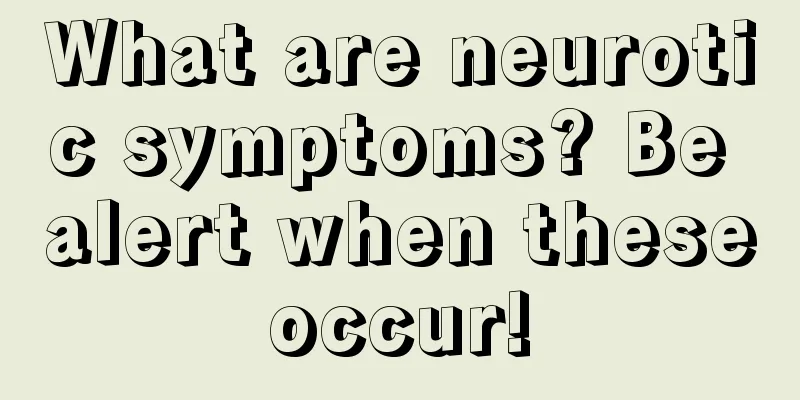What are neurotic symptoms? Be alert when these occur!

|
Neurosis is a mental or psychological disease. Generally speaking, the most obvious manifestation of neurosis is psychological pain. People will unconsciously focus on unnecessary things. In the long run, it will easily lead to a vicious psychological cycle and mental defects and mental illnesses. It can be treated through psychotherapy. You can also take a vacation to relax and maintain a good attitude. Causes of neurosis There are two key points in the formation of neurosis: one is the neurotic personality; the other is the excessive focus on perception or the effort to eliminate symptoms, which is determined by the neurotic personality. As a result, the patient's life deviates from the normal track and falls into a vicious cycle. Neuroticism is a personality trait with certain neurotic tones, and can also be understood as a special temperament of nervousness. Neurotic people have an experiential bias toward negative events. Neurosis often has a negative impact on an individual's career, love, life, and interpersonal relationships, and may even eventually lead to neurosis or other physical and mental illnesses. Neurosis is based on a neurotic personality. Under certain conditions, neurotic symptoms can occur in anyone. For example, you may feel nervous and at a loss when speaking in front of a group for the first time; you may feel very scared when you hear people talking about AIDS or cancer; and you may become extra cautious when you see your neighbor being robbed. For people with healthy personalities, the above reactions are only short-term and transient. Neurotic tendencies are one of the internal causes of various psychosomatic diseases. Anxiety disorders, phobias, hypochondriasis, etc. are all related to neurotic personality traits. Symptoms of neurosis People with neurotic personality will experience strong mental anxiety when facing psychological difficulties, which will lead to misunderstandings, and they will mistake the psychosomatic and physiological changes such as anxiety and discomfort that healthy people have as pathological or abnormal. The patient himself pays close attention to these "morbidities or abnormalities" and tries to eliminate them. However, the characteristic of these anxieties and discomforts is that the more attention is paid to them and the harder it is to eliminate them directly, the more severe they will become. As a result, a vicious cycle of attention and disease perception is formed, which makes the symptoms worse. Neurotic patients are caught in a state of mental conflict as they struggle with their symptoms and feel very painful. The stronger the patient's desire to "eliminate pathology or abnormality," the more severe the symptoms will be. Neurotic patients express their wishes by rebelling against society and interpret various social phenomena maliciously. Often come into conflict with others to show one's strength. They pursue pleasure and lack self-control. Although they know that some things are bad, they are easily tempted. They fly into a rage or even resort to violence if something doesn't go their way. Patients with high education levels often sing the praises of ideals, deny the real society, and even call for the destruction of the real society through violence for the sake of their ideals. Common characteristics of neuroticism: (1) The desire to survive is too strong. (2) Excessive introspection. (3) Focusing on life safety and paying too much attention to one’s own experiences or discomfort. (4) Worrying about gains and losses, being indecisive, and often postponing or avoiding making decisions. (5) Often feel insecure and like to overthink. (6) Overly sensitive to rejection and criticism. (7) Excessive pursuit of perfection. (8) Subjective imposition of an objective reality that is not subject to human will. Neurotic Examination Neuroticism can usually be diagnosed by clinical symptoms, while distinguishing the following: 1. Depression: Mainly characterized by a low mood that is disproportionate to the situation, ranging from melancholy to grief and even stupor. In severe cases, psychotic symptoms such as hallucinations and delusions may occur. Anxiety and motor agitation may be prominent in some cases. 2. Memory impairment: refers to a state in which an individual is unable to remember or recall information or skills. It may be a permanent or temporary memory impairment caused by pathophysiological or situational reasons. Memory includes recognition, retention, and reproduction, and is closely related to neuropsychological functions. Based on neurophysiological and biochemical research, memory is divided into instantaneous memory (within minutes and seconds), short-term memory (a few days) and long-term memory (months and years). Memory and forgetting go hand in hand, and forgetting has temporal regularity and selectivity. Newly learned materials are forgotten the fastest, and forgetting gradually develops to remote events. Things that once attracted high attention are more difficult to forget. 3. Consciousness disorder: Consciousness disorder refers to a state in which people’s perception of themselves and the environment is impaired, or the mental activities by which people perceive the environment are impaired. 4. Severe emotional disorders: Severe emotional disorders refer to long-term significant abnormalities in emotional or behavioral responses that seriously affect one's ability to adapt to life; the disorders are not directly caused by factors such as intelligence, sensory or health. Symptoms of mood disorders include psychiatric disorders, affective disorders, anxiety disorders, attention deficit hyperactivity disorder, or other persistent emotional or behavioral problems. |
<<: What are some tips for reducing anal swelling and pain?
>>: Correction and prevention methods of overbite
Recommend
What are the contraindications for gastric stump cancer surgery
Gastric remnant cancer can occur in the remnant s...
Can I cut off the skin tags myself? Care is especially important
Skin tags are a common disease, which some people...
Heavy menstrual flow after medical abortion
What should I do if my menstrual flow is heavy af...
How to prevent the worsening of ovarian tumors
How can we prevent ovarian cysts from getting wor...
10 early signs of cervical cancer
There is usually no accurate statement of the 10 ...
Four common symptoms help you detect early colorectal cancer
Due to its slow development, the early symptoms o...
Is urethritis contagious? How is it transmitted?
Urethritis is a common reproductive infection tha...
Attention! How long can you live with advanced colorectal cancer?
How long can you live with advanced colorectal ca...
How to scrape the belly correctly
Gua Sha originated from Chinese Traditional Medic...
What should I do if I feel sleepy after eating?
Some people feel sleepy after eating. There are m...
How to treat stiff neck after radiotherapy for nasopharyngeal carcinoma?
How to treat neck stiffness after radiotherapy fo...
What should I do if the soles of my feet become hot during menopause? How should I treat it?
For some friends who have entered menopause, ther...
Clinical diagnostic methods of osteosarcoma
When people suspect that they have osteosarcoma, ...
At which step should liquid foundation be used
When using liquid foundation, it is very importan...
How can I get rid of eye bags quickly and effectively?
The problem of eye bags makes many people look ve...









